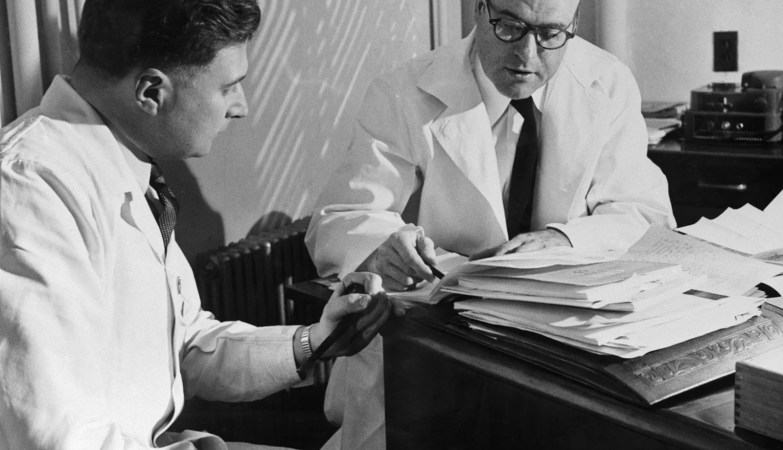As you get older, you may notice that your body responds to the common cold differently. Not only do you feel more wiped out, but it also might seem as if your runny nose, fatigue and other symptoms drag on for weeks.
Why does it take so long to recover? More importantly, what can you do to strengthen your immune system? To understand the answers to those questions, it helps to know how your immune system works — along with how it ages.
What is the immune system?
Unlike your heart or brain, you can’t point to any one part of your body and say, “Here’s my immune system.” Nor can you dissect a cadaver, extract the immune system and look at it inside a glass jar.
That’s because your immune system is a giant collection of cells that travel through your blood and tissues. In other words, it’s everywhere.
Two parts of your immune system work together to help you stay healthy.
The innate immune system
Think of these first-responder immune cells as scouts.
“They surveil the body for particles that aren’t you,” says Jessica N. Lancaster, Ph.D., assistant professor of immunology and cancer biology at Mayo Clinic in Arizona. “When these cells detect something foreign, they sound an alarm, and an immune response starts.”
During this immune response, enzymes mark germs as targets for other immune cells to attack. Blood vessels widen and become more permeable, leading to swelling, heat and redness.
The adaptive immune system
This part of the immune system operates like the military’s special forces. Once these antibodies and T and B cells have encountered a specific germ, they remember it. In the future, if you’re exposed to the same germ, your adaptive immune system will mount a more effective and swifter response.
“Both parts of the immune system are important. The first responders hold things down until the T and B cells can ramp up,” says Dr. Lancaster.
Does the immune system change as you age?
During adulthood, the T and B cells in the adaptive immune system decline in number and function, making it more challenging for the body to fight infections.
At the same time, innate immune cells proliferate, roaming the body and secreting substances that drive up inflammation.
“The innate cells are all signaling simultaneously that there’s a problem,” says Dr. Lancaster.
This chronic low-level inflammation — often called inflammaging — can exhaust the immune system, so there aren’t enough cells to fight infections. It also can damage nearby healthy tissues, says Dr. Lancaster.
Because of these changes:
It might take longer to recover from colds and flu. “You can easily lose a numbers game if you are fighting an aggressive virus or bacteria,” says Dr. Lancaster. Rather than staying confined to the nose or throat, more viruses may find their way into the lower respiratory tract, leading to pneumonia or bronchitis.
The risk of cancer goes up. When cells divide, they occasionally mutate. When we’re younger, the immune system quickly detects and neutralizes these mutant cells, preventing them from growing. However, the immune system doesn’t recognize cancerous cells as easily as we age. When these cells evade detection, they have more time to spread and grow.
Age-related diseases progress. The constant low-level inflammation from the aging innate immune system can damage tissues throughout the body, increasing the risk of heart disease, Alzheimer’s, Parkinson’s, osteoarthritis and many other diseases.
How do you know if your immune system is compromised?
Think of immunity as a continuum.
On one end of the continuum is weakened immunity. That’s when you might feel as if you catch one never-ending cold after another.
On the other end of the spectrum, however, is autoimmunity, when a too-strong immune system attacks healthy tissue.
Neither situation is ideal, so the sweet spot lies between the extremes.
“If you’re not thinking about your immune system,” says Dr. Lancaster, “It’s probably working well.”
That means:
- Wounds heal quickly.
- Your joints don’t ache from inflammation.
- You’re not suffering from allergies or hypersensitivities.
- You’re not fighting off what feels like an endless parade of illnesses.
How do you boost your immune system naturally?
To protect your immune system as you age, take steps to protect your overall health.
Prioritize sleep
During the COVID-19 pandemic, scientists noticed an interesting association. People who regularly slept fewer than six nightly hours tended to come down with more-severe infections and were more likely to die than people who regularly slept more.
During sleep, your immune system releases proteins that help fight off infection. Sleep deprivation may decrease the production of these protective cells.
“Sleep is probably the most critical aspect of immunity, more so than diet or exercise,” says Dr. Lancaster.
Read more: Can lack of sleep make you sick?
Exercise regularly
Moderate cardiovascular exercise — where you can talk but not sing — can increase the activity of virus-killing cells. This includes white blood cells and antibodies. On top of that, the muscle tissue preserved from strength training secretes anti-inflammatory substances — called myokines — that help to keep inflammation in check.
Aim for two strength training sessions and 150 minutes of moderate cardiovascular exercise weekly.
Eat a balanced diet
Throughout the internet, you’ll find people arguing about the pros and cons of a wide range of specialty diets, including paleo, low-carb, vegetarian, Mediterranean and more. However, most of these diets share one crucial feature. They encourage people to consume fewer ultraprocessed foods and eat more minimally processed whole foods like fish, low-fat dairy, vegetables, whole grains, legumes, nuts and seeds. This focus on minimally processed whole foods — especially whole plant foods — may reduce inflammation by improving gut health.
Make sure your vaccines are up to date
“Vaccines introduce your immune system to viruses in a very controlled manner,” says Dr. Lancaster. Specifically, they help the adaptive immune system spot and neutralize germs more quickly.
Vaccines become even more critical as you get older when viruses like RSV and the flu tend to cause more-severe infections, says Dr. Lancaster.
Your vaccine-inoculated immune system may attack germs so effectively that you never notice symptoms like a fever or runny nose. Other times, however, you might still feel sick. That doesn’t mean your vaccine didn’t work, says Dr. Lancaster. Likely, the vaccine helped your body to clear the virus more quickly so you could avoid severe complications like pneumonia.
Consider vitamin D
If you’re deficient in this sunshine vitamin — and many people are — a supplement could help to safeguard those adaptive immune cells that decline with age, says Dr. Lancaster. The recommended daily amount of vitamin D is 600 IU for people 70 and under, and 800 IU for people over 70.
Does vitamin C strengthen the immune system?
When researchers pooled the data from 24 studies involving more than 10,000 adults, they found that vitamin C supplementation in doses ranging from 250 to 1,000 milligrams seemed to help people recover from colds more quickly, perhaps by serving as an antioxidant. However, some studies found no effect or only a minimal effect.
According to the same research, zinc supplementation in doses ranging from 13 to 23 milligrams taken several times a day may offer similar benefits, especially when taken within 24 to 48 hours of the first symptoms.
Consult your healthcare professional before supplementing with either nutrient. If you decide to supplement with C, avoid taking high doses (over 2000 milligrams) for long periods, as they can lead to side effects like nausea, heartburn, fatigue and kidney stones.
Relevant reading
Mayo Clinic on Osteoporosis
Around 54 million Americans live with osteoporosis or low bone mass, but many don’t recognize the symptoms until it is too late. Before a bad fall or fracture renders you immobile, learn how to reduce your risk of developing osteoporosis, manage your day-to-day symptoms, and even treat the disease with the tools provided in Mayo Clinic on Osteoporosis.








